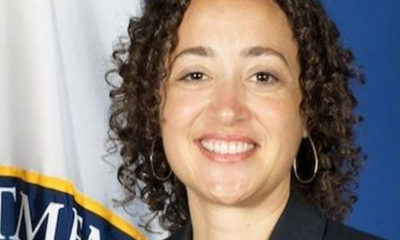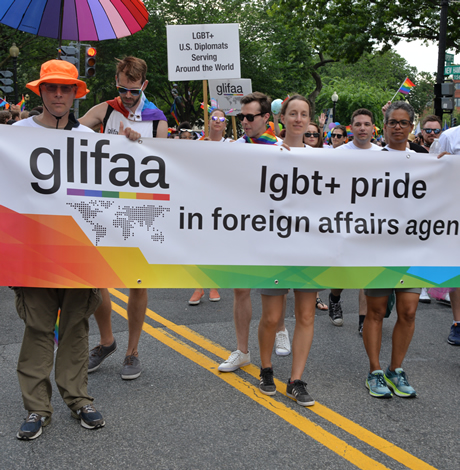News
DeVos still won’t say federal law bars anti-LGBT discrimination
Education secretary insists schools must follow federal law
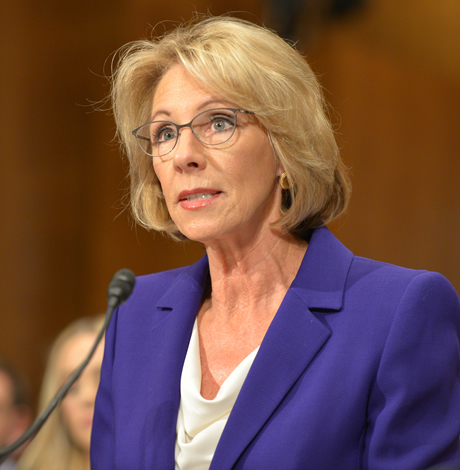
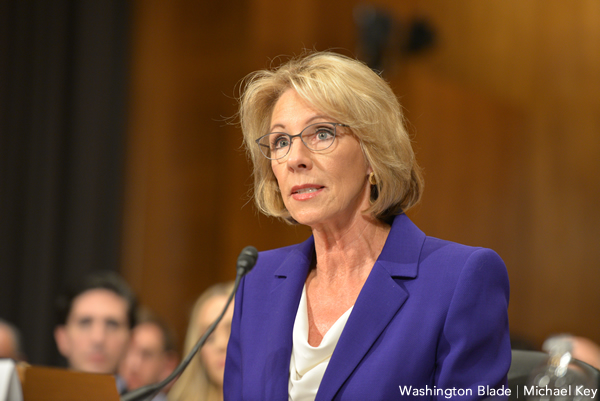
Education Secretary Betsy DeVos wouldn’t say charter schools are barred from anti-LGBT discrimination. (Blade photo by Michael Key)
Weeks after facing criticism for refusing to speak out in congressional testimony against anti-LGBT discrimination in charter schools, Education Secretary Betsy DeVos still won’t say federal law prohibits them from discriminating against LGBT students.
DeVos on Tuesday referred generally to rules under federal law in a testy exchange on whether she’d speak out against anti-LGBT discrimination in charter schools with Sen. Jeff Merkley (D-Ore.), who said the statute in this area is “somewhat foggy.”
Although DeVos acknowledged charter schools aren’t eligible for U.S. government money if they violate federal laws against discrimination, she dodged when asked specifically if charter schools under her plan would be able to discriminate against LGBT students.
“I said it before and I’ll say it again that schools that receive federal funds must follow federal law,” said DeVos, who’s promoting a Trump administration plan that calls for a $250 million increase in school voucher funds.
When Merkley insisted federal law is foggy and pressed DeVos again on whether anti-LGBT discrimination would be allowed under her proposal, she said, “On areas where the law is unsettled, this department is not going to be issuing decrees. That is a matter for Congress and the courts.”
Merkley interrupted to seek clarification, but DeVos would only repeat her deference to Congress and the U.S. Supreme Court when the law is unclear.
Visibly frustrated, Merkley said he interprets DeVos’ response to mean “where it’s unsettled, such discrimination will continue to be allowed under your program,” adding if that interpretation is incorrect, she should make a correction in the record.
Asked the same question as it pertains to discrimination against students on the basis of religion, DeVos’ response was no different.
“Again, for schools that receive federal funds, federal law must be followed,” DeVos said.
When Merkley demanded DeVos answer the question as it pertains to religious discrimination against students, she said, “Schools that receive federal funds will follow federal law. Period.”
The Oregon Democrat rebuked DeVos for a response he said is too vague.
“You’re refusing to answer the question,” Merkley said. “I think that’s very important for the public to know that today the secretary of education before this committee refused to affirm that she would put forward a program that bans discrimination based on LGBTQ status of students or bans discrimination based on religion.”
DeVos protested Merkley’s characterization of her words, denying her response indicated any support for allowing discrimination in charter schools.
“Sir, that’s not what I said,” DeVos said. “That’s not what I said. Discrimination in any form is wrong. I don’t support discrimination in any form.”
Merkley asked for a yes-or-no answer on whether DeVos’ program bans discrimination, the education secretary replied, “What program are you talking about?” Merkley said it was her charter and private school grant proposals, prompting DeVos to repeat her previous response.
“As I said before, and let me say it again, schools that receive federal funds need to follow federal law. Period,” DeVos said.
Interrupting DeVos, Merkley concluded, “You said the same thing 10 times without answering the question at all.”
Although she wouldn’t say federal law bars discrimination against LGBT students, DeVos’ general repudiation of discrimination in any form is different from an earlier exchange with Rep. Katherine Clark (D-Mass.). At the time, DeVos wouldn’t denounce discrimination in any capacity when asked about anti-LGBT or racial discrimination in charter schools.
Denouncing DeVos for her response was Sarah Kate Ellis, CEO of GLAAD, who said in a statement the secretary’s words were leaving LGBT students out in the cold.
“By once again turning a blind eye to LGBTQ students who experience discrimination in school, Secretary DeVos continues to prove why she was the wrong choice to lead our nation’s education system,” Ellis said. “DeVos once claimed she was an LGBTQ ally, but has now supported back to back policies that would erase LGBTQ students from classrooms. If she wants to be known as more than an anti-LGBTQ activist the time is now to reverse course.”
Federal law doesn’t explicitly ban anti-LGBT discrimination, but it does bar sex discrimination. Courts are increasingly interpreting those laws to prohibit discrimination on the basis of sexual orientation and gender identity. That’s likely what Merkley meant when he said existing federal law on the issue is “somewhat foggy.”
Title VI of the Civil Rights Act of 1964 prohibits discrimination on the basis of race, color, and national origin for any school accepting federal funds, and Title IX of the Education Amendments of 1972 prohibits discrimination on the basis of sex for any school accepting federal funds. There is an exemption in Title IX for religious schools, but not for charter or secular private schools.
The Obama administration had issued guidance making clear Title IX precludes schools from barring transgender students from the restroom consistent with their gender identity, but DeVos along with U.S. Attorney General Jeff Sessions revoked it at the start of the Trump administration. Media reports indicated DeVos resisted that move and she later met with LGBT groups and transgender students at the Education Department.
Vanita Gupta, CEO of the Leadership Conference on Civil & Human Rights, said she’s “glad to hear” DeVos opposes discrimination, but called for action.
“Words alone are insufficient,” Gupta said. “She must use her authority as secretary to make that prohibition and those protections for students real. The department must also proactively support schools to prevent discrimination and intervene when the law is broken. This can’t just be about talk; students need and deserve action.”
Merkley is lead sponsor in the Senate of the Equality Act, comprehensive legislation that would make explicit a ban on anti-LGBT discrimination in every area of civil rights law, including education.
West Virginia
Appeals court strikes down W.Va. transgender athlete ban
Ruling finds law violates students’ constitutional rights, Title IX
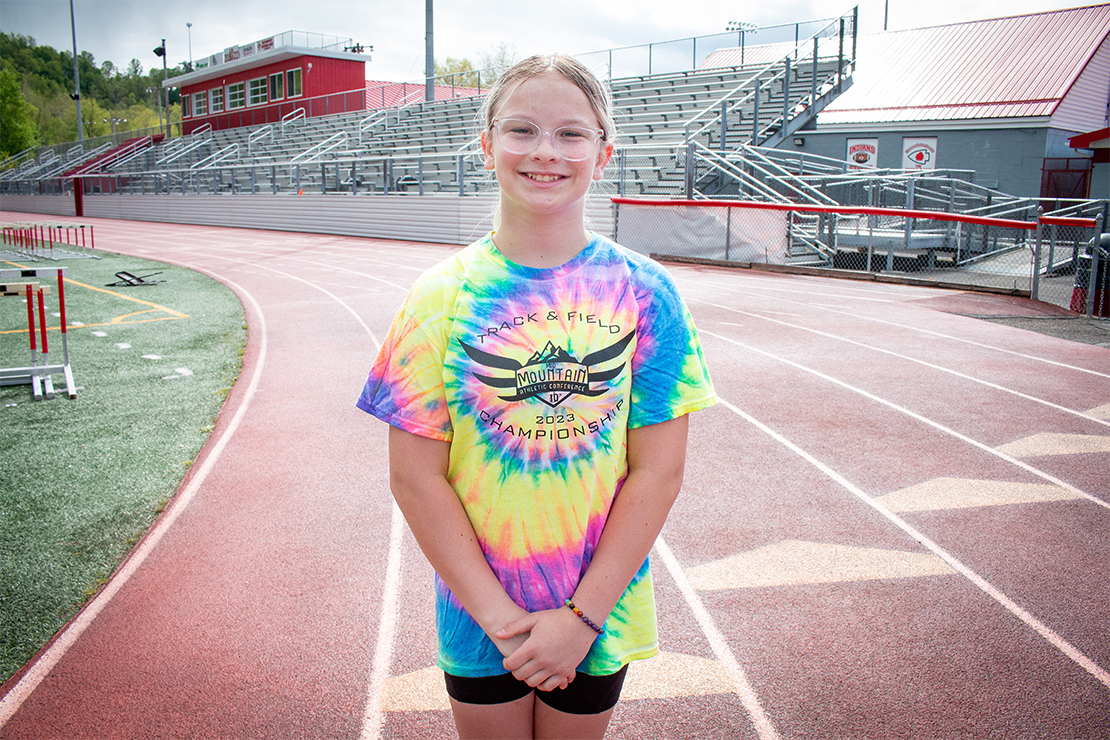
BY LORI KERSEY | The 4th U.S. Circuit Court of Appeals has struck down West Virginia’s ban on transgender athletes, finding the law violates trans students’ rights under the Equal Protection Clause of the constitution and Title IX, a federal civil rights law prohibiting discrimination based on sex in education programs.
The case, B.P.J. vs. the West Virginia Board of Education, was filed in May 2021 on behalf of Becky Pepper-Jackson, a 13-year-old trans middle school student and track athlete who would be barred from participating if the ban is upheld. Pepper-Jackson is represented by the American Civil Liberties Union, the American Civil Liberties Union of West Virginia and Lambda Legal.
In April 2021, West Virginia Gov. Jim Justice signed into law a bill prohibiting trans women and girls in the state from participating in sports that align with their gender identity. The U.S. Court of Appeals in February 2023 blocked the state from removing Pepper-Jackson from her school’s track and field team as legal advocates appealed a lower court’s ruling upholding the ban.
In Tuesday’s ruling, Judge Toby Heytens wrote that offering Pepper-Jackson the “choice” between not participating in sports and participating only on boys teams is not a real choice.
“The defendants cannot expect that B.P.J. will countermand her social transition, her medical treatment, and all the work she has done with her schools, teachers and coaches for nearly half her life by introducing herself to teammates, coaches and even opponents as a boy,” the judge wrote.
“By participating on boys teams, B.P.J. would be sharing the field with boys who are larger, stronger, and faster than her because of the elevated levels of circulating testosterone she lacks,” he wrote. “The Act thus exposes B.P.J. to the very harms Title IX is meant to prevent by effectively ‘exclud[ing]’ her from ‘participation in’ all non-coed sports entirely.”
In a statement Tuesday, Joshua Block, senior staff attorney for the ACLU’s LGBTQ and HIV Project, called the court’s ruling “a tremendous victory for our client, transgender West Virginians and the freedom of all youth to play as who they are.”
“It also continues a string of federal courts ruling against bans on the participation of transgender athletes and in favor of their equal participation as the gender they know themselves to be,” Block wrote. “This case is fundamentally about the equality of transgender youth in our schools and our communities and we’re thankful the 4th Circuit agreed.”
“We hope today’s ruling sends a message of hope to the trans youth of West Virginia,” Aubrey Sparks, legal director of the ACLU of West Virginia, said in the statement. “And a message of warning to politicians who continue to dehumanize this vulnerable population.”
West Virginia is one of 21 states that have banned trans student-athletes over the last three years, according to the ACLU.
In a statement Tuesday, West Virginia Attorney General Patrick Morrisey vowed to defend the ban and said he is “deeply disappointed” in the decision.
“The Save Women’s Sports Act is ‘constitutionally permissible’ and the law complies with Title IX,” Morrisey said. “I will keep fighting to safeguard Title IX. We must keep working to protect women’s sports so that women’s safety is secured and girls have a truly fair playing field. We know the law is correct and will use every available tool to defend it.”
******************************************************************************************

Lori Kersey is a reporter with a decade of experience reporting in West Virginia. She covers state government for West Virginia Watch.
******************************************************************************************
The preceding article was previously published by the West Virginia Watch and is republished with permission.
Nonprofit, nonpartisan, independent journalism not hidden behind a paywall. Mountaineers are always free, and so is West Virginia Watch.
West Virginia Watch is part of States Newsroom, the nation’s largest state-focused nonprofit news organization.
News
News is Out, Word In Black and Comcast NBCUniversal welcomes 16 journalism fellows to cover Black and LGBTQ+ communities
The fellows will receive best practices, learnings and mentorship from journalists and media professionals at News is Out, Word In Black and NBCUniversal.
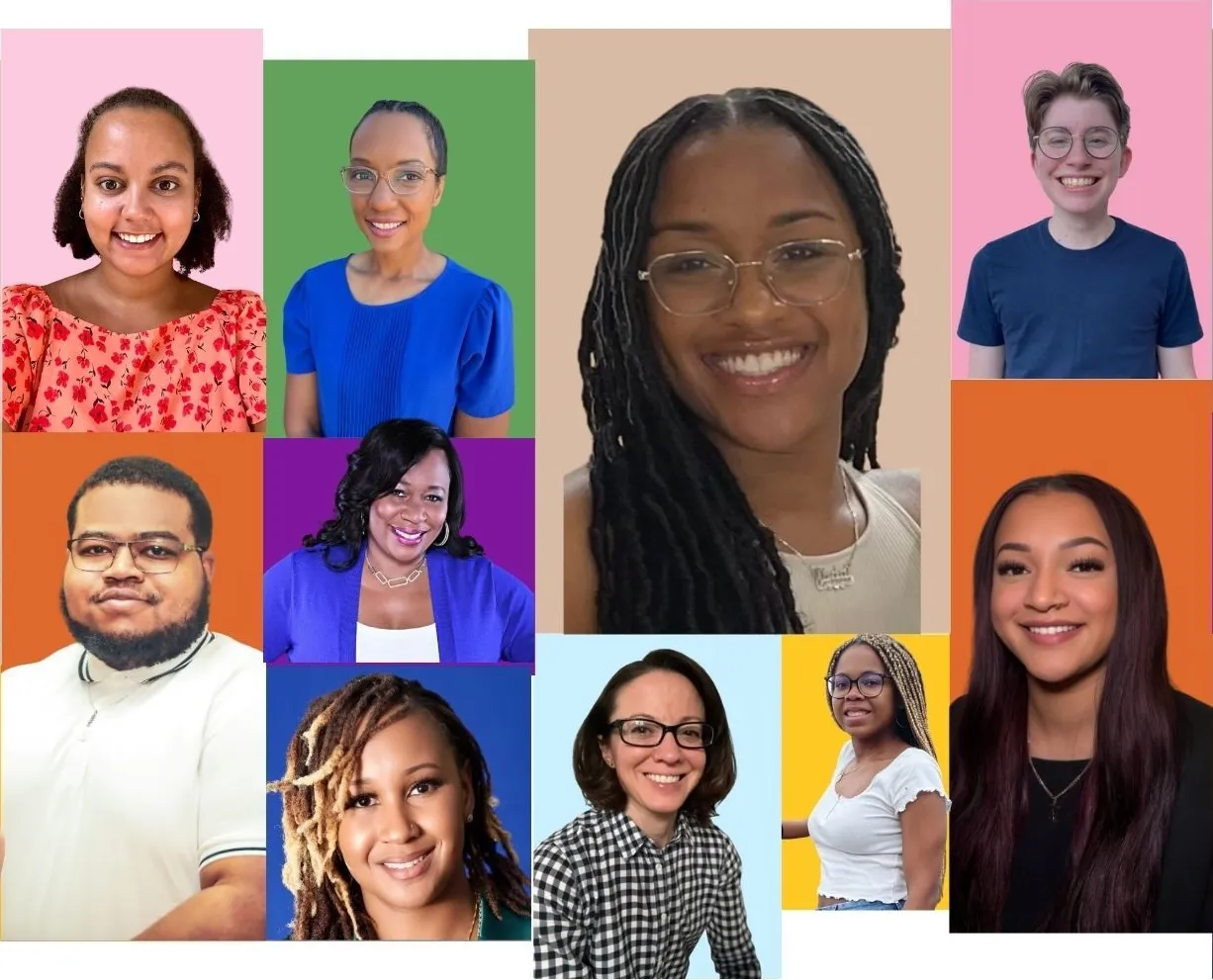
Today, News is Out and Word In Black, together announced the 16 fellows selected for The Digital Equity Local Voices Lab, a new initiative powered by Comcast NBCUniversal to place journalists at 16 Black and LGBTQ+ serving news publications across the country. During the year-long fellowship, the group will receive the training and resources needed to tell stories within marginalized communities through media and technology and celebrate the work being done by Black and LGBTQ+ leaders in their communities.
“Through Project UP, we are proud to donate $1 million to launch this unique, first-of-its-kind program that will support coverage of Black and LGBTQ+ topics in the media as well as emerging journalists with a passion for reporting on issues of importance to these communities,” said Dalila Wilson-Scott, EVP and Chief Diversity Officer, Comcast Corporation and President, Comcast NBCUniversal Foundation.
“Comcast is one of the earliest corporate leaders in LGBTQ+ inclusion, so it should come as no surprise that they understand the value of local LGBTQ+ media,” said Mark Segal, founder of the Philadelphia Gay News and member of News is Out. “Their investment in our growth is also an investment in the future leadership of LGBT media and intersectional LGBTQ+ media.”
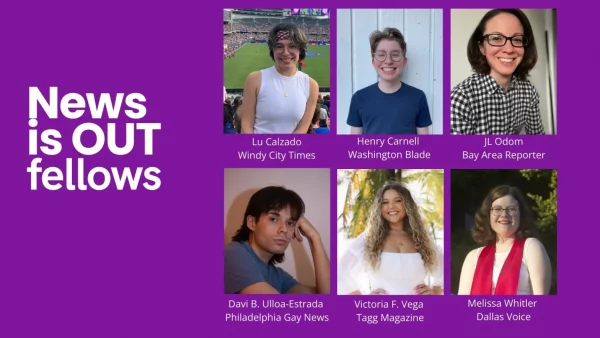
The fellows will receive best practices, learnings and mentorship from journalists and media professionals at News is Out, Word In Black and NBCUniversal. In addition, they will report on stories of Black and LGBTQ+ entrepreneurs and creatives in their communities, share training and resources on using technology more in their daily lives, report on policy related to technological access and connectivity, and share the work being done to advance digital equity.
“I am excited to be a part of a fellowship that is specifically geared toward the promotion of diversity, inclusivity and intersectionality,” said Davi B. Ulloa-Estrada, News is Out and Philadelphia Gay News fellow. “We are missing such crucial and different perspectives on world issues, so I look forward to being a part of this project.”
“This fellowship program is the epitome of what journalism means to me – using innovation and creativity to fuel a passion for multimedia storytelling and uplift the voice and perspective of the overlooked,” said Word In Black and Washington Informer fellow, Jada Ingleton. “It means so much to know that I’ll be in a position to produce stories that could enact change and affect lives the same way generations of journalists impacted mine.”
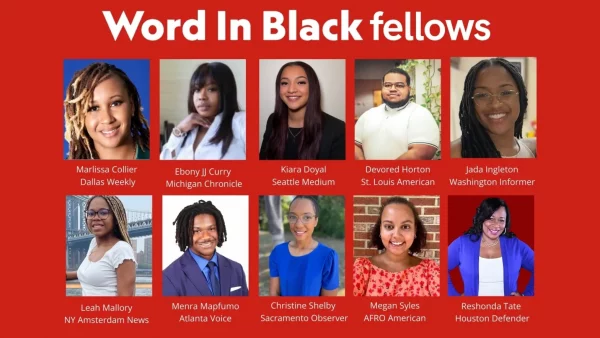
The Local Media Foundation (LMF) is managing the fellowship and Lab and facilitating content creation to reach diverse audiences between the 16 publishers, Comcast NBCUniversal and NBCU Academy. Word In Black and News is Out are collaboratives that were launched by LMF.
The 16 fellows are:
- Megan Sayles, AFRO News (Baltimore)
- Menra Mapfumo, The Atlanta Voice (Atlanta)
- J.L. Odom, Bay Area Reporter (San Francisco)
- Melissa Whitler, Dallas Voice (Dallas)
- Marlissa Collier, Dallas Weekly (Dallas)
- ReShonda Tate, Houston Defender (Houston)
- Ebony “JJ” Curry, Michigan Chronicle (Detroit)
- Leah Mallory, New York Amsterdam News (New York City)
- Davi B. Ulloa-Estrada, Philadelphia Gay News (Philadelphia)
- Christine Shelby, The Sacramento Observer (Sacramento)
- Kira Doyle, Seattle Medium (Seattle)
- Devored Horton, The St. Louis American (St. Louis)
- Victoria F. Vega, Tagg Magazine (National)
- Henry Carnell, Washington Blade (Washington, D.C.)
- Jada Ingleton, The Washington Informer (Washington, D.C.)
- Lu Calzada, Windy City Times (Chicago)
In February, the three organizations announced the launch of The Digital Equity Local Voices Lab and application period. The Lab is part of Project UP, Comcast’s $1 billion initiative to connect people to the Internet and advance digital equity and economic mobility through programs and community partnerships that open doors for the next generation of innovators, entrepreneurs, storytellers, and creators across Comcast, NBCUniversal, and Sky.
India
Indian political parties for the first time include LGBTQ rights in election platforms
Voters will begin to cast ballots on April 19

The world’s largest democratic exercise will begin in India on April 19 as citizens begin to cast their votes in the country’s election.
This year’s election is different because national level political parties for the first time are promising to extend marriage rights to same-sex couples as part of their election platforms.
The Indian National Congress, one of India’s oldest political parties, promised after wide consultation that it would introduce a bill that would recognize civil unions between couples who are part of the LGBTQ community. The party, which has governed India for the majority of the period since independence from the U.K. in 1947, has refrained from taking a stance on laws that include Section 377, which criminalized consensual same-sex sexual relations.
Then-Health Minister Gulam Nabi Azad in 2011 when the INC was in power said homosexuality is a disease. He made the controversial comment while speaking at an HIV/AIDS conference in New Delhi, the Indian capital.
“Unfortunately, this disease has come to our country too,” said Azad. “Where a man has sex with another man, which is completely unnatural and should not happen but does.”
When the Delhi High Court was hearing the Naz Foundation case, the Home Affairs Ministry opposed the striking down of Section 377 based on its belief that homosexuality cannot be morally condoned. The INC never struck down Section 377, which criminalized homosexuality, in parliament.
A 5-judge panel on the Supreme Court on Sept. 6, 2018, decriminalized consensual same-sex sexual relations.
The Communist Party of India (Marxist) on April 4 unveiled its platform with a range of socialist commitments, including support for LGBTQ rights. Among these pledges is to amend the Transgender Persons (Protection of Rights) Act 2019 to address community concerns and ensure legal recognition and protection for same-sex couples akin to marriage.
The platform also outlined plans to introduce a bill similar to the Special Marriage Act of 1954, which allows partners to be listed as dependents and facilitating like inheritance, alimony in the event of divorce and other issues. The party further pledged to enact a comprehensive anti-discriminatory bill that would include LGBTQ people, ensure quotas in educational institutions and implement horizontal reservations in employment.
Addressing the issue of crimes against LGBTQ people, the platform promised to treat such offenses on par with crimes against heterosexuals. The platform also calls for tackling bullying, violence and harassment of gender non-conforming and LGBTQ people in educational settings, enforcing anti-hazing policies and combating hazing based on sexual orientation and gender identity.
The platform further touched issues related to transition and informed consent.
The Special Marriage Act of 1954 is a law that provides for civil unions among Indians and Indian nationals who live abroad, regardless of the religion or faith followed by either party. This law enables people from two different religious backgrounds to enter into marriage. Parliament in 2019 passed the Transgender Persons (Protection of Rights) Act that extended rights to trans people.
Brinda Karat, a former member of the Rajya Sabha, the upper house of the Indian Parliament, and leader of the Communist Party of India (Marxist), spoke with the Washington Blade and said the current government has homophobic ideas that are not acceptable to the party.
The ruling government under Prime Minister Narendra Modi is striving to secure more than 400 parliament seats in the upcoming election, aiming for a substantial majority.
Various polls conducted by Indian news organizations indicate a probable victory for the ruling Bharatiya Janata Party. In response to the BJP’s dominance, Congress and several national and regional parties have joined forces as the Indian National Developmental Inclusive Alliance.
This alliance comprises 26 opposition political parties. Despite its formation, however, there is no clear coalition strategy in place and only two parties have included LGBTQ-specific policies in their election platforms.
The Blade reached out to Congress’ spokesperson for comment, but has not received a response. The BJP also did not respond to a request for comment.
The party has yet to release its election platform.
Ankush Kumar is a reporter who has covered many stories for Washington and Los Angeles Blades from Iran, India and Singapore. He recently reported for the Daily Beast. He can be reached at [email protected]. He is on Twitter at @mohitkopinion.
-

 LGBTQ Non-Profit Organizations5 days ago
LGBTQ Non-Profit Organizations5 days agoDay of [no] silence, a call to speak out against anti-LGBTQ+ hate
-

 Africa2 days ago
Africa2 days agoCongolese lawmaker introduces anti-homosexuality bill
-

 Colorado4 days ago
Colorado4 days agoFive transgender, nonbinary ICE detainees allege mistreatment at Colo. detention center
-

 Politics4 days ago
Politics4 days agoFirst lady warns Trump is ‘dangerous to the LGBTQ community’ at HRC event

